-
-
-
-
-
-
-
-
-
-
-
-
-
-
-
-
-
-
-
-
-
-
-
-
-
-
-
-
-
-
-
-
-
-
-
-
-
-
-
-
-
-
-
-
-
-
-
-
-
-
-
-
-
-
-
-
-
-
-
-
-
-
-
-
-
-
Context menu entry fields
-
-
-
-
-
-
-
-
-
-
-
Context menu entry fields
The input fields for design elements have a context menu that allows you to insert specific values or objects.
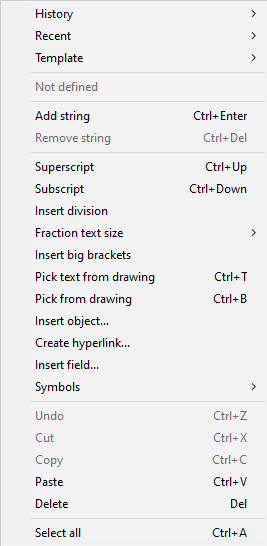
Let's look at the frequently encountered context menu commands:
-
"History" - call the last entered values.
-
"Recent" - call the most frequently used values. Configurable by the user. After typing the desired text, you can add it to the list of frequently used ones for subsequent quick access to it.
-
"Template" - recording insert patterns. Similar to the "Recent" command, only you can add a new entry if the text contains a link to an object. When calling a template, it requests an object in the drawing.
-
"Add string" - the command adds an additional input field.
-
"Remove string" - the command deletes the input field.
-
"Superscript" (combination Ctrl+Up) - insert superscript.
-
"Subscript" (combination Ctrl+Down) - insert subscript.
-
"Insert division" - insert division.
-
"Pick from drawing" - The command allows you to take data from the drawing and from the properties of objects. When you call this command, the "Value picker" panel appears, containing the following commands:

-
 Measure distance (Z) - take a linear or diametric geometric dimension from the drawing. The command can be called by pressing the Z key. As a result, the text will be inserted.
Measure distance (Z) - take a linear or diametric geometric dimension from the drawing. The command can be called by pressing the Z key. As a result, the text will be inserted. -
 Measure angle (Х) - take an angular dimension from the drawing. The command can be called by pressing the X key. As a result, the text will be inserted.
Measure angle (Х) - take an angular dimension from the drawing. The command can be called by pressing the X key. As a result, the text will be inserted. -
 Measure perimeter (С) - take the perimeter value of a closed line or the length of a broken line from a drawing. The command can be called by pressing the C key. As a result, the text will be inserted.
Measure perimeter (С) - take the perimeter value of a closed line or the length of a broken line from a drawing. The command can be called by pressing the C key. As a result, the text will be inserted. -
 Measure area (V) - take the value of the area of the closed contour on the drawing. The command can be called by pressing the V key. As a result, the text will be inserted.
Measure area (V) - take the value of the area of the closed contour on the drawing. The command can be called by pressing the V key. As a result, the text will be inserted. -
 Complex area (Shift+V) - take the value of several areas of a closed contour on the drawing. As a result, the text will be inserted.
Complex area (Shift+V) - take the value of several areas of a closed contour on the drawing. As a result, the text will be inserted. -
 Take from property (В) - - the command allows you to take parameter values from a drawing object. It is inserted while maintaining a dynamic link with the object. As a result, an object with its own context menu will be inserted (see below). When changing a part parameter, the line in the input field changes.
Take from property (В) - - the command allows you to take parameter values from a drawing object. It is inserted while maintaining a dynamic link with the object. As a result, an object with its own context menu will be inserted (see below). When changing a part parameter, the line in the input field changes.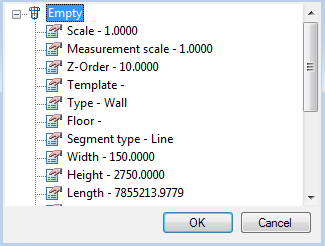
Note: To insert static text, hold Ctrl while selecting the option. -
 Take from text (N) - take text from the drawing. The result will be inserted text.
Take from text (N) - take text from the drawing. The result will be inserted text. -
 Calculate (M) - calculate the numerical value using the built-in calculator nanoCAD Construction . As a result, the text will be inserted.
Calculate (M) - calculate the numerical value using the built-in calculator nanoCAD Construction . As a result, the text will be inserted. -
 Take from notes (,) - paste text information from your notebook. The result will be pasted text.
Take from notes (,) - paste text information from your notebook. The result will be pasted text.
-
-
"Insert object..." - allows you to insert graphic objects into the text nanoCAD Construction (roughness designations, standard parts, etc.). To implement, you need to call the command and specify the implementation object. As a result, the object will be inserted with the preservation of the dynamic link, which has its own context menu (see below).
-
"Create hyperlink ..." - allows you to create a hyperlink to a file located at the installation location nanoCAD Construction or a page on the Internet. When you call the command, the "Hyperlink" dialog will open, where you must specify the visible text and address. As a result, an object will be inserted that has its own context menu (see below). The link will be visible in the tooltip when you hover over the object.

-
"Insert field ..." - allows you to insert drawing properties. After calling the command, you must select a property in the "Field" dialog. As a result, an object will be inserted with the preservation of the dynamic link, which has its own context menu (see below).
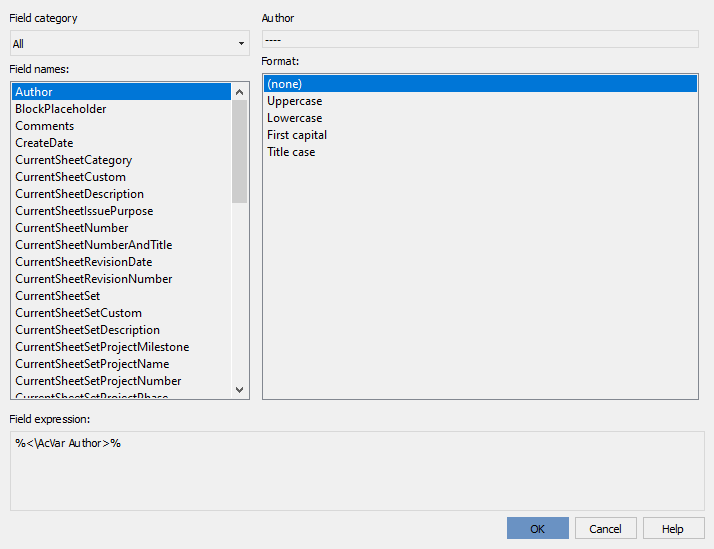
-
"Symbols" - insert special symbols.
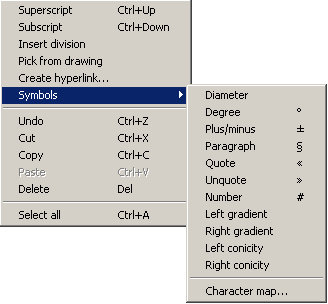
-
"Undo" (combination Ctrl+Z) - undo the last command.
-
"Cut" (combination Ctrl+Х) - cut to clipboard.
-
"Copy" (combination Ctrl+С) - copy to clipboard.
-
"Paste" (combination Ctrl+V) - paste from clipboard.
-
"Delete" - delete values in the input field.
-
"Select all" - select the values of the input field.
In addition to the frequently encountered commands of the context menu of input fields, there are also individual commands that belong to certain fields. The operation of these commands is described in the corresponding sections of the reference manual.
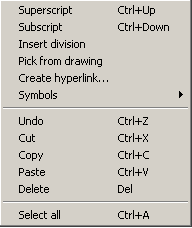
Context menu of input field for objects
Each inserted object in the input field has its own context menu.
Pick from drawing
- Update - updates the value of the property.
- Edit formula... - opens the "Formula" dialog, where you can set the calculation formula (see below).
- Show object - shows the object from which the property was taken.
- Convert to text - converts an object to text.
- Remove - deletes the object.
Inserting object
- Edit object... - calls an object for editing. The command is available only for parametric objects.
- Zoom to text height - scales the object to the height of the line.
- Use original geometry properties - takes design properties from the original.
- Extract... - extracts a copy of an object for insertion into a drawing. The command is available only for parametric objects.
- Top align - aligns the object to the top edge.
- Center align - aligns the object to the center.
- Bottom align - aligns the object to the bottom edge.
- Remove - deletes the object.
Hyperlink
- Go - follow the link.
- Edit hyperlink ... - opens the "Hyperlink" dialog for editing.
- Convert to text - converts an object to text.
- Remove - deletes the object.
Field
- Update - updates the value of the property.
- Edit field... - opens the "Field" dialog for editing.
- Edit formula... - opens the "Formula" dialog, where you can set the calculation formula (see below).
- Show object - shows the object from which the property was taken.
- Convert to text - converts an object to text.
- Remove - deletes the object.
Dialog "Formula"
When specifying a formula, the "#" symbol must be present, indicating the value of the property.

Available operators:
| Operator | Description |
|---|---|
| + | Addition |
| - | Subtraction |
| % | Floating point module |
| * | Multiplication |
| / | Division |
| ^ | Exponentiation |
| () | Parentheses |
| . | Decimal separator |
Available functions:
|
Purpose |
Syntax |
|---|---|
| Cosine | cos (expression) |
| Sinus | sin (expression) |
| Tangent | tan (expression) |
| Arccosine | acos (expression) |
| Arcsine | asin (expression) |
| Arctangent | atan (expression) |
| Hyperbolic cosine | cosh (expression) |
| Hyperbolic sine | sinh (expression) |
| Hyperbolic tangent | tanh (expression) |
| Hyperbolic arccosine | acosh (expression) |
| Hyperbolic arcsine | asinh (expression) |
| Hyperbolic arctangent | atanh (expression) |
| Square root | sqrt (expression) |
| Signum function (-1, 0, 1) | sign (expression) |
| Rounding to the nearest whole number | round (expression) |
| Truncation of a decimal fraction | trunc (expression) |
| Rounding down | floor (expression) |
| Rounding up | ceil (expression) |
| Absolute value | abs (expression) |
| The largest element in a sequence | max (expression 1; expression 2) |
| The smallest element in a sequence | min (expression 1; expression 2) |
| Degrees to radians | d2r (expression) |
| Radians to degrees | r2d (expression) |
| Logarithm, base e | ln (expression) |
| Logarithm, base 10 | log (expression) |
| Degree, base e | exp (expression) |
| Degree, base 10 | exp10 (expression) |
| Power function | pow (expression 1; expression 2) |
| Random Decimal, 0-1 | Random |


 De
De  Es
Es  Fr
Fr  Pt
Pt 
